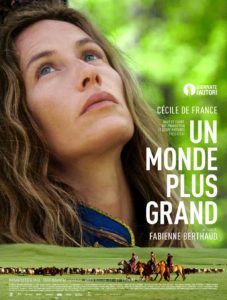Dunkerque, « La Halle aux sucres »
14h30 Exposition/Débat « Au pays du vent », avec Fabienne Berthaud et Corine Sombrun. Modératrice Charlotte Fauve
14h30 Exposition/Débat « Au pays du vent », avec Fabienne Berthaud et Corine Sombrun. Modératrice Charlotte Fauve
1er Novembre 2019 – Performance « Voice Trance Gost Dance » with Simon Mayer (Choreographer- Trance Performer)/Corine Sombrun (Trance performer)
2pm-9pm
Hauntology, the study of spooks and visitations, looks for things in the presence that exist or do not yet exist, for those unachieved potentials and unfulfilled hopes that make ghosts walk the earth. In this project, defined as a mix of straightforward congress, séance and film shoot, theorists and artists meet to talk about – and with – spirits. Hamlet’s ghost will be there, and the spectre of communism has also been invited. The title comes from the concept of hauntology, which was developed by Jacques Derrida in his book „Spectres de Marx“. Basically it is about the need to remember the ones not living anymore (and the ones not yet born) in times that are, as Hamlet put it, out of joint. In these times, Derrida suggests, spectres of the past and of the future might be a source of hope and a chance to go beyond the boundaries of our present world.
Brut : Karlsplatz 5 – 1010 Vienna, Austria
The Hauntological Congress: Performance Simon Mayer/Corine Sombrun: « Voice Trance Ghost Dance »
Hauntology, the study of spooks and visitations, looks for things in the presence that exist or do not yet exist, for those unachieved potentials and unfulfilled hopes that make ghosts walk the earth. In this project, defined as a mix of straightforward congress, séance and film shoot, theorists and artists meet to talk about – and with – spirits. Hamlet’s ghost will be there, and the spectre of communism has also been invited. The title comes from the concept of hauntology, which was developed by Jacques Derrida in his book „Spectres de Marx“. Basically it is about the need to remember the ones not living anymore (and the ones not yet born) in times that are, as Hamlet put it, out of joint. In these times, Derrida suggests, spectres of the past and of the future might be a source of hope and a chance to go beyond the boundaries of our present world.
Brut – Karlsplatz 5 , 1010 Vienna, Austria
Avant-première du film « Un monde plus grand » de Fabienne Berthaud à 20h. Projection suivie d’un débat.
42 Place des Comtes du Maine 72000 LE MANS
Tél : 02 43 51 28 18
Emission « Vertigo » de Pierre Philippe Cadert et Laurence Froidevaux
Radio Télévision Suisse, La première – Emission « Vertigo » de Pierre Philippe Cadert et Laurence Froidevaux

Avant-première du film « Un Monde plus grand » de Fabienne Berthaud, en présence de la réalisatrice et de Corine Sombrun
Projection à 20h, suivie d’une discussion avec Fabienne Berthaud et Corine Sombrun
Bd. de St-Georges 8 - 1205 Genève
Corine Sombrun évoque ici la vie d’Enkhetuya, la chamane qui l’a formée durant plus de dix ans aux rituels des peuples de la steppe. A la fois document ethnologique et récit biographique, ce livre retrace une histoire du chamanisme des années 1950 à 2010, avec les résultats du premier protocole de recherche sur la transe chamanique mongole étudiée par les neurosciences dont Corine Sombrun est à l’origine.
Appartenant au peuple des Tsataans du nord de la Mongolie, Enkhetuya est née en 1957 dans la taïga de la région d’Ulaan Uul où ses parents élevaient des rennes, tout en pratiquant leurs rituels en secret (la République populaire mongole, sur le modèle soviétique, interdisant toute pratique arriérée et contraire à l’homme nouveau). Une enfance dure, primitive, autarcique, où elle rêve d’être institutrice. Mais sa mère, d’une lignée de chamanes, découvre vite ses dons. Formée par un grand maître, Enkhetuya devient une chamane puissante aux cérémonies très demandées pour soigner toute maladie ou supprimer les sorts. Quand Corine Sombrun la rejoint, elle vit encore avec sa famille dans un monde protégé de la modernité, où le respect de la nature et des rituels est omniprésent, où la dure vie d’éleveur de rennes est tributaire du climat, des prédateurs et des quotas de production imposés par l’Etat. Les années 2000, l’afflux des touristes, la voiture, la télé et le téléphone vont bouleverser l’équilibre de leur écosystème. Et ce que 70 ans de communisme n’avaient pas réussi à éradiquer, 10 ans d’économie de marché l’accomplit, aucun Tsataan n’échappe plus au dieu argent et à l’ère du marché planétaire.